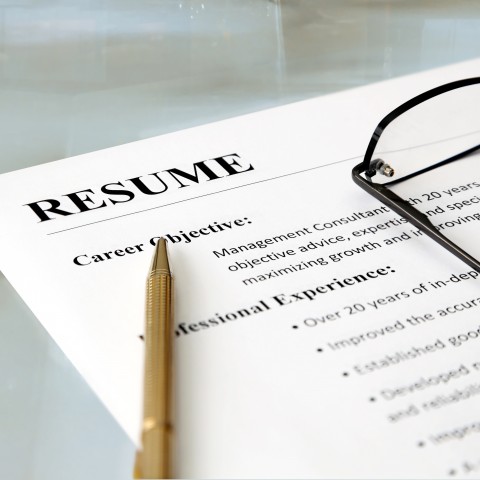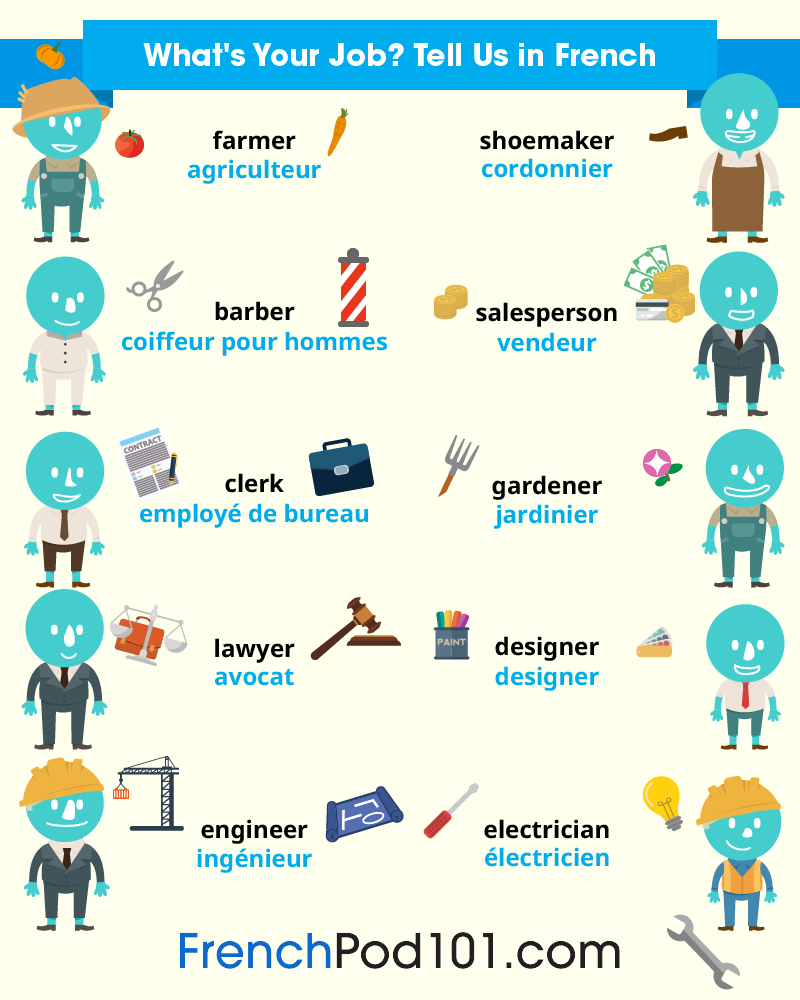
Have you ever dreamed of living and working in France? If you’ve read the first part of this guide about How to Find Jobs in France, you already know why: It’s not just the elegant charm of the City of Love or the amazing cheesy meals of the Savoie. It’s also the numerous advantages of working for a French company and benefiting from our labor laws.
But how do you go about writing a resume in French or creating a French CV?
In the first chapter, you’ve seen that there are many job opportunities for foreigners. You’ve also learned what kind of work you can find in France, and how to search for it using a wide range of job-hunting tools and resources. Now that you know how to find a job, let’s see how to get that job!
This guide will go through everything you need to know to land your dream job, from the application process with a French resume, to the specifics of the job interview and the perks of the local working culture.

1. How to Apply for a Job

J’aime mon travail. (“I love my job”)
1- Create Your French-Style Resume
The French resume is called CV for “Curriculum Vitæ” and doesn’t differ too much from its North American counterpart. But there are a few things you need to know to make it perfect! First, here’s a French CV example:
Raoul DUPONT (1)……………………………………………………………………….. (2) raoul.dupont@frenchmail.fr 25 rue de la corniche 75001 Paris +33 601010101 Guide Touristique Certifié – Trilingue (3) __________ Expérience Professionnelle (4) Juin 2012 – Décembre 2015 ………Conseiller Voyage – Belle-Aventure, Evry (France) Janvier 2016 – Mai 2019 …………….Guide Touristique – CoolTrip, Montréal (Canada) __________ Formation (5) 2015 – 2017 ………………………………………….MBA Tourisme International, Paris 8 __________ Compétences (6)
Voyage, photographie, écriture. |
- (1) Personal information
As you can see from this sample CV in French, all basic contact information goes on the top left corner. Note that the contact information in French resumes can vary from person to person, but these are the basics:
- Your full name
- Your age
You’re allowed to give this information in France, but it’s not mandatory. As this is still a discriminating factor, I would recommend not including it. - Physical address
This could be omitted as well. In most cases, it doesn’t really make a difference whether you include it or not. But in some cases, it could work against you if, for example, you’re living remarkably far from the company you’re applying for.
- Email address
- Phone number
That’s it! No need to add your IQ, blood type, or astrological sign.
- (2) Photo or no photo?
Unlike in other countries, it’s perfectly fine to put your photo on your French resume. You can smile, but keep it serious and professional, unless you’re applying in a specific work field where creativity is valued. If you have a photo you would like to use, this would be the place to put it.
However, it’s not mandatory and it’s better not to have a photo than to have a bad one!
- (3) Give a title to your CV!
This is often overlooked, but with more and more French companies going through resumes with automated search tools, it’s becoming important. It’s also the line that will stand out when your recruiter opens the resume.
Ideally, the title of your resume should highlight the most important degree or skill of experience relevant to the job you’re trying to get. For instance, even if you’re a graduate programmer from a top-notch school, don’t make it your title if you’re looking for a job in real-estate!
Here are some examples:
Guide Touristique Certifié – Trilingue (Certified Tour Guide – Trilingual)
Assistant Commercial Immobilier (Real-estate Sales Assistant)
The usual list of sections in a French CV is as follows:
- (4) Expérience Professionnelle (Work Experience)
You can mention everything, but only add details when it’s relevant for the job.
- (5) Formation (Education)
List your degrees and certifications in chronological order (or reverse), with the years and cities/countries. You might want to put this section first if your work experience section seems short. - (6) Compétences (Skills)
The section for skills in French resumes is usually short and is divided into sections, such as Langues (Languages) or Informatique (IT). It’s also a good place to mention your Permis de conduire (Driver’s license).
- (7) Centres d’intérêts (Personal interests)
This is not as straightforward as you might think. If you have dangerous or notoriously time-consuming hobbies, better leave them out. I recommend including those that seem to fit with the job you’re applying for or the company’s values.
Take the time to customize your CV for the specific job and company, and of course, make it flawless and easy to read! You’ll find enormous amounts of resources online about how to write a perfect resume.
Except for what I’ve mentioned above, it should apply to the French CV!

Make it flawless and easy to read!
2- The Subtle Art of Cover Letters
The French Lettre de motivation (Literally “Motivation letter,” or “Cover letter” in English) is a delicate exercise of balance. On one hand, it’s highly codified and somewhat artificial; on the other hand, it needs to feel genuine and original enough to catch your reader’s attention. But on a third hand, you can’t be too different, because it’s highly codified!
Let’s have a look at the unavoidable classics of cover letters and let’s debunk some of the nonsense you might come across while researching about French cover letters online.
First, keep in mind that the French letter is almost never more than one page long.
It should look roughly like this:
| Raoul DUPONT (1) raoul.dupont@frenchmail.fr +33 601010101 ………………………………………………………………………………..MyDreamCompany ……………………………………………………………………………..34 rue des Croissants …………………………………………………………………………………………75001 Paris ……………………………………………………………………………..A Lille, le 22/09/18 (2) PJ : Curriculum Vitae (3) Objet : Candidature au poste de Professeur d’Anglais (Ref #7854) (4) Madame, Monsieur, (5) Why am I contacting this company? (6) What do I have to offer to this company? (7) Why am I the perfect person for this position? (8) Veuillez agréer, Madame, Monsieur, mes meilleures salutations. (9) Raoul Dupont (10) |
- (1) Remind your reader who you are by reusing the personal information from your CV.
- (2) Put the company name and address, followed by the date and where the present letter is written from.
- (3) Remind what documents are attached to this letter (most likely your CV).
- (4) Under Objet (Topic), be perfectly explicit about why you’re writing with a sentence such as Candidature au poste de ____ (Application for the position of ____) followed by the exact name of the position as mentioned in the job offer (if any). If there’s a reference code, you can add it there for extra clarity.
- (5) If you know the name of your reader, you can use it here. For instance: Monsieur Fontaine, (Mister Fontaine,). Always use the last name (with the proper spelling!).
Never use Cher Monsieur Fontaine, (Dear Mister Fontaine,). It’s not formal enough. And if you don’t know who’s going to read it, or have any doubts, go for the fool-proof: Madame, Monsieur, (Madam, Mister,).

Hold on! The perfect cover letter is only one page long.
Next comes the body of your letter. In France, it’s typically made of three paragraphs, each with a specific purpose:
- (6) The first one is about your target company: Why are you applying? Why this specific company?
If you’re passionate about it, it’s time to explain why. If not, a bit of hypocrisy doesn’t hurt—but don’t go too heavy on the soft-soaping! Researching about the company will help you to avoid being too vague.
You can use sentences such as:
Intégrer la société ___ au poste de ___ m’attire tout particulièrement pour ___.
“Joining the ___ company in a position of ___ is especially tempting because ___.”
- (7) The second paragraph is about you, and more specifically, what you have to offer. Sell yourself without sounding like a bombastic jerk! Always the delicate balance.
You can use sentences such as:
Ma formation en ___ m’a permis d’acquérir de nombreuses compétences en ___.
“During my studies in ___, I developed strong skills in ___.”
- (8) The last paragraph explains why your personality and unique set of skills make you the perfect candidate for the job. This is where you outshine the competition by keeping the target company above any further temptation of self-glorification. Make it about what you can give them and how you can help them, not just about yourself.
It could include:
___ mettre mes compétences à votre service.
“___ to put my skills at your service.”
But really, there’s no template for this part. Be specific, be genuine, and don’t use empty words just because they sound good.
- (9) The salutations section is trickier than it seems in a French letter, and you’ll read a lot of garbage about it online, ranging from old-fashioned or submissive to straight-up grammatically incorrect.
My personal favorites are:
Veuillez agréer, Madame, Monsieur, mes meilleures salutations.
Veuillez recevoir, Madame, Monsieur, mes respectueuses salutations.
“Please receive, Madam, Mister, my best / respectful salutations.”
- (10) Sign here with your full name. If the letter is printed, I like to hand-sign it.
3- Professional Social Networks & Online Reputation
Although French employers aren’t as crazy about LinkedIn as North Americans, your online presence on such networks can absolutely be a plus! The most popular in France are:
- LinkedIn: A massive network of professionals where you can put your resume, join communities, and follow the careers of your contacts. Depending on your profile, you may get contacted directly by employers or Headhunters.
- Viadeo – France: The French cousin of LinkedIn, and although not as popular, it’s preferred by some companies.
Once you have a bright and shiny profile with a stunning photo, it doesn’t hurt to add a link on your resume!

Réseau social professionnel (“Professional social network”)
If you’re not already registered on one of these networks, take a moment to consider whether it makes sense in the context of your job search. Small local businesses shouldn’t care too much about it, while big corporations will appreciate the extra mile.
One last note: Be careful with what you publicly publish on social networks. More and more frequently, French recruiters are browsing social media to get a better idea of the applicants; thus, displaying controversial opinions or outrageous photos might be unwise!
2. Interviewing for a Job in France

You’ve sent a beautiful French-style CV attached to an elegant Lettre de motivation (Cover letter) and you got an appointment to a job interview? Well done! The hardest part is behind you, but you still have to capitalize on your success and land the job! Here’s some information on how to interview in French with prospective employers.
1- Research! Knowledge is Power
The first thing to do before a job interview in French is to do some serious homework. This is as true in France as it is in any country. Recruiters will gauge your enthusiasm and interest for the company just as much as they will your capacity to fill the position.
- Research thoroughly about the company. Find out about its history, how it operates, its current contacts, and general health. Anything you find out might come in handy!
- Research about the position. This involves reading the job offer about a hundred times, researching about professionals who are assuming a similar role on professional social networks, and finding out about the average salary.
- Research about your recruiter: This is the person you’re about to meet. You don’t want to be a Facebook stalker and compliment him on his beautiful wife, but being aware of his position and role within the company is a plus.
2- How to Ace Your French Job Interview
Assuming that you already know how to conduct a job interview, I’ll mainly cover the specifics of the French culture when it comes to meeting a recruiter on a typical job interview.
1. Greetings – Keep it Formal and Kiss-free!
I know we kiss a lot in France! We do La bise to our friends and family, and during many casual (or even professional!) situations. But you should, under no circumstances, initiate a kiss toward a recruiter during a job interview. Instead, go for a firm handshake, with a smile and confident eye contact.
The usual greetings for a job interview are:
- Bonjour. (Good day)
- Bonjour Monsieur. or Bonjour Madame. (Good day mister or madam)
- Bonjour Monsieur Fontaine. or Bonjour Madame Fontaine., (Using their last name after the greeting)
Pick one depending on the meeting’s level of formality. If your recruiter seems very relaxed and friendly, is wearing an old t-shirt, and opens the conversation on a first name basis, Bonjour Monsieur may be too uptight.
- Check out our free vocabulary list on FrenchPod101 to find out how to introduce yourself for your job interview!

You can’t go wrong with a firm handshake.
2. Tu or Vous? Follow Their Lead
In French, you can address a person with one of two types of “you.” Tu is the casual “you” while Vous is for formal and professional encounters.
In the context of a job interview, always open with Vous. Then, if your interlocutor wants to switch to Tu, simply follow their lead. But most interviews are conducted with the Vous from start to finish.
Some examples are:
- Comment allez-vous ? (How are you doing?)
- Ravi de vous rencontrer. (Nice to meet you.)
3. Classic French Questions & Answers

Unlike other countries, where you can warm up with a bit of small talk, French recruiters usually have a no-chit-chat policy. They’ll cut straight to the chase and start asking questions.
Also, be prepared to be asked about what you may consider to be personal topics, such as your marital status, kids, or hobbies. This is perfectly acceptable in France!
Here are some of the most common questions asked during a job interview, so you can prepare and think about how to answer them:
- Parlez-moi de votre expérience professionnelle.
“Tell me about your job history.”
- Parlez moi de vos études.
“Tell me about your studies.”
Quels sont vos diplômes ?
“What degrees do you have?”
Quel est votre parcours scolaire?
“What is your educational background?” - Que savez-vous sur notre entreprise ?
“What do you know about our company?” - Pourquoi pensez-vous être un bon candidat pour ce poste ?
“What makes you think you are a good fit for this position?”
- Pourquoi pensez-vous que nous devrions vous embaucher ?
“Why do you think we should hire you?”
- Quelles langues parlez-vous ?
“Which languages do you speak?”
Quel est votre niveau en Anglais ?
“What is your level in English?”
Parlez-vous couramment Anglais ?
“Are you fluent in English?” - Quand seriez vous disponible pour commencer ?
“When could you start working with us?” - Quelles sont vos prétentions salariales ?
“What kind of salary are you expecting?”
- Quelles sont vos forces ? Votre principal défaut ?
“What are your strengths? Your biggest flaw?”
- Pourquoi avez-vous quitté votre dernier emploi ?
“Why did you leave your previous job?”
Pourquoi souhaitez-vous quitter votre employeur actuel ?
“Why do you wish to leave your current employer?”
- For more resources on how to talk about jobs, be sure to check out our free vocabulary list on FrenchPod101.

Quels sont vos diplômes ? (“What degrees do you have?”)
3. French Work Culture
1- A Strong Work Ethic
The French work culture is by no means perfect, but I want to highlight some of its strengths as well as the kind of qualities you’ll have to develop if you want to thrive in this environment.
- French employees have a reputation for being hard workers. You may smile after reading about our avalanche of days off and our 35-hour weeks, but you want to make the best of these hours. You want to end up being more productive than you would be if you were sleep-working sixty hours a week while ruminating on your unpaid overtime.
- Autonomy and creativity are highly regarded qualities in a French company. You’re expected to be technically proficient and to quickly learn how to handle yourself without constant supervision. Collective work is still a thing, but your individual performance is more important than in some other countries.
- Having a critical mind isn’t seen as an annoying flaw of character, but as an important asset. It’s perfectly fine, and even encouraged, to comment and criticize the work and ideas of your colleagues as long as you’re bringing value to the table. This critique-based approach can put you off if you’re used to more agreeable work cultures, but it’s for the greater good!
2- A Friendly Work Environment
Although very vocal with their critiques, French workers tend to keep their work environment as friendly and relaxed as possible. It’s not to say that you can’t end up in horrible, hostile work environments, as it happens in any country; but overall, the French are very relational with their peers.
You’re likely to develop strong bonds with your coworkers that extend way beyond your workplace and last much longer than your employment period.
- Lunchtime is serious business! No, really. Lunchtime in the middle of your work day can easily take up to two hours, but it’s not just casual conversation and joyful wine-tasting: Many work-related discussions happen over lunch, and business deals are frequently signed over a cheese platter!
Don’t get me wrong. French lunches ALSO have casual conversations and glassfulls of wine. Hard to go back to your quick sandwich lunch after that. - After-hours mingling also takes an important part in the workplace social life of many companies. It’s common to go for a drink after a hard day of labor, and one beer leading to the next, you might spend more time with your coworkers than with your spouse!

Connecting with your colleagues.
4. How FrenchPod101.com Can Help You Get a Job in France
In this guide, you’ve learned how to expertly craft your French CV and cover letter in order to apply for a job in France, as well as how to handle yourself during the job interview. Do you feel ready to go job-hunting and make friends in your new workplace? How about to create a French CV and interview with your potential employer?
FrenchPod101.com has tons of free vocabulary lists with audio recordings that can help you prepare for your interview:
- How to introduce yourself
- How to talk about jobs
- Agreeing or disagreeing in a conversation
- Professional meetings
And much more!
If your job interview is conducted in French (and in most cases, it will be), the best way to maximize your chances of landing the job is to carefully prepare yourself for the interview.
A good exercise is to ask yourself the typical questions for a French job interview and try to write down your answers using all of the free resources that you can find on FrenchPod101. It will make you much more confident when it comes time for your interview!
Remember that you can also use our premium service, MyTeacher, to get personal one-on-one coaching and have your private teacher check your answers to make them perfect!












